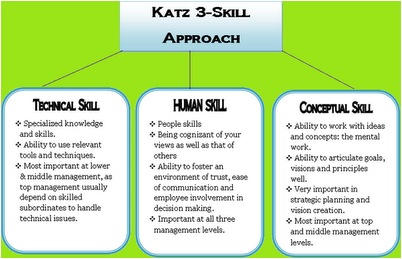Northouse (2013) describes the trait perspective as “certain individuals have special innate or inborn characteristics or qualities that make them leaders.” These are what would be known as “natural born leaders,” in that they are able to be a leader based on their personalities. A behavior, on the other hand is a way of conducting oneself; a behavior is how one reacts and responds to situations. The key word here is “situation.” Traits are not based on situations or environments that a person is in. Behavior, on the other hand, has a lot to do with the situation that the person is involved with. It is a significant criticism of the trait approach and is a major strength of the skill (behavior) approach (Northouse, 2013).
In my professional career, I have witnessed a variety of leadership styles. The one that currently comes to mind is the skills approach style. Skills approach takes a leader centered perspective on leadership (Northouse, 2013), with more emphasis on the skills and abilities that can be learned. Using Katz’s (1955) model, the three skill approach suggests that effective leadership depends on three essential personal skills: technical, human, and conceptual (Northouse, 2013). These are skills that could be learned. The technical skill is knowledge and proficiency in a type of work or activity (Northouse, 2013). Human skill is the ability and knowledge around working with people (Northouse, 2013). Human skills involve people, technical involve working with things, and conceptual skills involve working with ideas (Northouse, 2013). This includes, but is not limited to, working and creating a vision or plan for the work group and implementing that plan.
 In my current role, I am a manager who has worked my way up the ranks. I have been with my Firm for over nineteen years but, I started with an entry level position – with vary few genetic leadership traits. There is not much, if any, aspect of my current department, database, processes, team or leadership vision and strategy that I do not know. As the times change, however, so do expectations and technology – annual training, feedback and development goals come in to play when this happens. Many of my technical and human skills were learned on the job since I was hired as a trainee almost two decades ago – I don’t consider myself a “natural born leader” in this respect. I would have to assess my leadership as being deeply rooted in the professional situations and knowledge that I have acquired over the years.
In my current role, I am a manager who has worked my way up the ranks. I have been with my Firm for over nineteen years but, I started with an entry level position – with vary few genetic leadership traits. There is not much, if any, aspect of my current department, database, processes, team or leadership vision and strategy that I do not know. As the times change, however, so do expectations and technology – annual training, feedback and development goals come in to play when this happens. Many of my technical and human skills were learned on the job since I was hired as a trainee almost two decades ago – I don’t consider myself a “natural born leader” in this respect. I would have to assess my leadership as being deeply rooted in the professional situations and knowledge that I have acquired over the years.
Northouse, P. G. (2013). Leadership: Theory and Practice (Sixth Edition). Thousand Oaks, CA: Sage Publications.
Penn State World Campus (2013). PSYCH 485 Lesson 4: Skills Approach. Retrieved on September 22, 2013, from https://courses.worldcampus.psu.edu/su13/psych485/001/content/03_lesson/04_page.html
